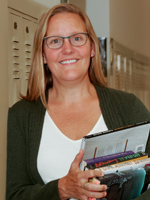Thursday, June 3
Noon-1:15pm EST
Title: Teacher Research for Social Change
Abstract: This conversation will focus on the ways that practicing teachers can explore issues of culture, difference, and equity by conducting research into their own practice. I will draw on my experience teaching an LGBTQ-themed Literature Course in a high school, but also on the work of teachers who contributed to a book I edited, entitled Adventurous Thinking. Their work focuses on immigration; linguistic diversity; religious diversity, particularly Islam; racial diversity, with particular attention to Black people; regional diversity, specifically a rural community; sexual and gender identities; and (dis)abilities. The conversation will be grounded in the assumption that teaching can be a revolutionary act.
Facilitator:
Dr. Mollie Blackburn
Professor, Department of Teaching and Learning
College of Education and Human Ecology
The Ohio State University

Biography:
Mollie Blackburn, PhD (she/her) is a professor in the Department of Teaching and Learning in the College of Education and Human Ecology, at The Ohio State University. Her research focuses on literacy, language, and social change, with particular attention to lesbian, gay, bisexual, transgender, queer, and questioning (LGBTQ) youth and the teachers who serve them.
She has published in journals such as Reading Research Quarterly, Research in the Teaching of English, and Teachers College Record, among others. She is the author of Interrupting Hate: Homophobia in Schools and what Literacy can do about it and the co-editor of Acting Out!: Combating Homophobia through Teacher Activism, which received the Phillip C. Chinn Book Award, the Richard A. Meade Award, and the American Library Association’s CHOICE Book Award.
She has received WILLA’s (Women in Life and Literature Assembly of the National Council of Teachers of English) Inglis Award for her work in the areas of gender, sexuality, sexual orientation, and young people; the Queer Studies special interest group of the American Educational Research Association’s award for a body of work; and the Alan C. Purves Award for an article in the Research in the Teaching of English deemed rich with implications for classroom practice.

